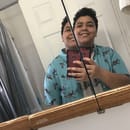Recently, Ellen DeGeneres was photographed with George W. Bush at a football game. This sparked some backlash because of Bush’s anti-LGBTQ platform during his presidency. Ellen responded to the criticism with lighthearted jokes and an overall message of treating others, even those with whom you disagree, with kindness. The next day, many of the conservatives I follow littered my timeline with this clip and the picture of the two of them with captions like “YES!!” or “More of this” or “RESTORES MY FAITH IN HUMANITY.” To that I say: it’s not that simple.
The vast majority of my family prioritizes conservative views and some of my friends lean right as well. I love them dearly and have never attempted to cut them out of my life. So yes, Ellen, we should treat people with kindness. But how can it be considered “kind” to take away mine and others’ rights? The Ellen video came out the same day the Supreme Court debated whether or not someone could be fired for being LGBTQ+ and Ellen decided to equate Bush’s fight against LGBTQ+ right to marriage to her thinking it’s too early for Christmas music. Ellen’s words gaslight her whole community and empowered complicit behavior within privileged groups.
Everyone is entitled to their own opinions and beliefs, but stop using tokens like Ellen to pretend that those views are neutral. Playing Christmas music too early is annoying but ultimately harmless; viewing LGBTQ+ people as deserving of less is actively harmful. Some people may dismiss my point by telling me that marriage equality has been achieved so Ellen has learned to forgive and forget, but believe or not, there is more to equality than marriage. Ideologies don’t change overnight, and neither do oppressive structures. A change in a single law does not undo structures that continue to oppress communities.
On the same weekend Ellen was photographed with George Bush, the LDS General Conference was held. The LDS Church was a huge part of my upbringing and plays a big role in the culture of Utah. The ever-present influence of the LDS church in my life has forced me to negotiate a relationship with the Church and its members. This is something that every LGBTQ+ Church member, active or not, has to do because of the doctrine taught and reinforced. Ellen’s call to kindness reminded me of many things said by the Mormon Church about relationships with LBGTQ+ folk. Dallin H. Oaks, in reference to LGBTQ+ members, stated, “Our walk demands that we not compromise on commandments but show forth a full measure of understanding and love. Our walk must be considerate of children who are uncertain about their sexual orientation, but it discourages premature labeling because in most children such uncertainty decreases significantly over time. Our walk opposes recruitment away from the covenant path, and it denies support to any who lead people away from the Lord. In all of this, we remember that God promises hope and ultimate joy and blessings for all who keep his commandments.” Statements like this actively harm LGBTQ+ members that are inside and outside the LDS institution. Queer youth and adults internalize these messages that their very being is a sin and against their faith’s “walk.” Members can also internalize these messages and view their queer friends and family members as “other.”
When young queer people grow up being bombarded with certain ideologies, it can lead them to feel very alone and have negative effects on their mental health. Studies have shown that ex-Mormons and LGBTQ+ Mormons have a higher rate of mental health problems (for example PTSD, depression, and anxiety) than the general population. When criticized, the Church responded to treat those queer youth with kindness and love. But it’s hard to feel loved when you’ve internalized these messages.
I understand that there is a lot of cognitive dissonance within the Church. Members of the LDS Church do not get to dictate and decide what they are being taught; they love their gospel and their God, and I won’t dismiss this as a “just leave” problem. I understand that you, yourself, may struggle constantly with your relationship with God and the Church’s view of LGBTQ+ members. But you do not get to wave Ellen in queer faces to guilt them about their resistance to a relationship with you.
Queer celebrities like Ellen are not the spokespeople for the LGBTQ+ community and neither am I. Each of us acts as a piece of a quilt that is the queer experience. Similarly, you may not agree completely with everything said in the Mormon Church; you’re just a piece of the LDS experience. That being said, our pain is real, valid, and tangible. Many of my favorite people are Mormon and I love them very much. But that’s because I know them as people. Ellen and I don’t get to speak to other’s experiences. These institutions cause real harm and everyone is entitled to their pain.



